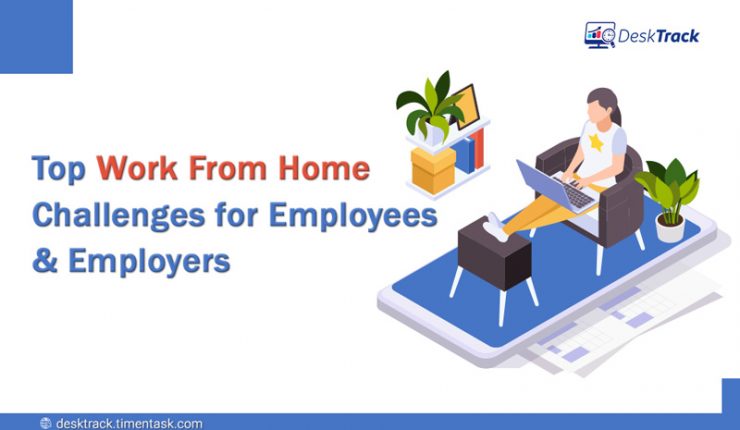
Working from home is one of the biggest trends since COVID. It has many benefits and can help you gain much more from your workplace even as you keep up with your family. However, there are also many challenges of working from home for employers & employees. Some of these remote work challenges for companies can cause so much harm to employees’ productivity that businesses may tank.
Knowing this, we have prepared an article about problems & solutions of working from home for freelancers and everyday workers. Specifically, this article includes some work-from-home challenges for employers or employees, the benefits of working from home, and solutions to each of the identified problems.
What are the Challenges of Working from Home for Employees
Despite the many benefits of remote work, there are several problems you should consider before making the decision. Some of these challenges in remote working may be trivial enough for you to ignore, while others may not be. Regardless, you can make a more level-headed choice of going with working on-site or from home after going through the subsequent list of work-from-home challenges for employees and employers.
1. Distractions
Distraction are generally thought to be the biggest challenge of working from home for employees. Traditional office spaces are designed with considerations for work. If there is a flower at the corner of your cubicle, for example, you can be sure that it isn’t only there because it beautifies the corner. Even if this is the case, that beautification is expected to spur you to work by making you even a bit more comfortable so you can do more productive work. So, there are a few things that would distract you from your work.
However, your home space is less likely to have these motivating variables in the form of furniture arrangement, air circulation, and the rest. Naturally, this means that there will always be something familiar to distract you. You might even space out and forget that you are supposed to be working since your workstation is at home and there are too many things to hold your attention and divert it from work duties.
2. Disconnection from the Core Values of the Workplace
In addition to distractions, working from home can also disconnect you from the core values and sentiments of your workplace. There is something distinct and unique about every workplace, that is, the actual location. The smells, features, and other things that are native to your place of work are some of the stimulating factors. When you don’t have access to these things, it might take a very long time before you can properly acclimate to working from home.
Beyond the physical things of the workplace that you would be disconnected from when you work from home, there are also the values of punctuality, attentiveness, and others that may no longer affect you. Thus, there is a high likelihood that you might let go of the company culture after being away from the physical location for so long. Of course, this is assuming that your workplace is not chiefly operating the remote working model.
3. Communication Gaps
Communication and collaboration gaps are also very common with remote work as compared with the traditional model of working from a physical location with colleagues that you can touch and keep your eyes on. On the one hand, a supervisor may no longer be able to surprise a supervisee since they would not be able to look over the latter’s shoulders. However, this also means that there might always be a gap in communication and collaboration as a result of the absence of the possibility of physical contact.
So common is the communication gap problem as a result of remote work that work from home challenges in India are considered to be similar to those in Haiti, Singapore, and other areas of the developed or developing world. And this gap has a way of reducing team performance and productivity.
4. Absence of Strong Supervisory Motivation
Motivation is a big part of work, especially where teams are involved. When there is motivation in a team, the team usually works the way gears run. The activity of one part is reflected on the other and spurs yet another to action, and so on. Furthermore, this system works effectively because there are nodes of support that urge the system to run. These nodes are the supervisory variables that can take the form of a team leader or division/department supervisor. However where teleworking is the system in place, the supervisory variable may not be able to directly motivate employees to work without engaging extra variables like technology.
So, motivating employees through direct supervision is a big challenge when working from home. It can also impact individual and remote team productivity negatively while making the work process less efficient than it can be when using the traditional model.
5. Problem with Time Management
How many people can retain a disciplined mentality when there is no supervision? This is another big challenge of working from home and having no supervisor to ensure that timestamps are kept. If you are the majority of freelancers and other workers that run their gigs from home, then you might be unable to keep up with some of the requirements of your workplace especially as it has to do with deadlines. After all, there would be many ‘home things’ to distract you.
Thus, if you are a teleworker, you have to deal with the problem of time management. The more time you seem to have on your hands, the less work you are likely to do.
6. Persistent Need to Be Virtually Present
Still on the matter of the absence of supervision, one of the issues with working from your home space is that you will feel the need to be virtually present, at least in the beginning. If you are an employee who just started remote work, you would think that your supervisor needs extra effort from you to know that you would be just as productive while working from home. And if you are an employer, the need to be virtually present would even be stronger than it would be for an employee. Regardless of which role you play, this persistent need or desire can keep you edgy and ruin your work.
So, if you are considering whether to choose between working from home or from the office, make note of the fact that the former option would push you to want to prove yourself. So, you will most probably struggle with being present online so your boss knows that you aren’t slacking off.
7. Persistent Need to Overwork
Similar to the persistent need to be online all the time so that nobody thinks you are sleeping or playing video games, you would also feel a great need to work overtime as evidence that remote work is just as productive (or even more productive) compared to the traditional system. So, in working overtime, you may likely stress yourself and end up falling ill or even hating your job.
So, contrary to the idea that remote work causes people to slack off, working from home may motivate you to burn the midnight oil or overburden yourself to the point of losing the spark and excitement from satisfying work.
8. Gap in Traditional Employee Engagement
Similar to communication and collaboration gaps, remote work also tends to create a gap in employee engagement. If you are an employer who counts employee engagement as one of the evidence of a healthy place, it might be difficult to measure this factor when your employees are working from home. Even when you use technological applications that allow you to spy on your workers, how are you going to stimulate them towards being more collaborative and engaging themselves for more productive work?
So, considering how important employee engagement is to productive teamwork, working from home can place a strain on your performance. This is highly likely to be the outcome of remote work whether you are an employer or employee, unless you have strategies in place to plug the employee engagement gap.
9. High Risk of Boredom and Listlessness
For most people, remote work begins as an exciting prospect. There is so much to do: they can finally listen to music blaring in the background while they work or finally work in silence without the buzzing of office life. However, this excitement and option for freedom and control might quickly wear out, giving way for boredom and/or listlessness. And neither of these outcomes are enabling factors for productive or meaningful work.
Interestingly, the high risk of boredom and listlessness can also spring from loneliness. This is another contradictory implication of working from home and another reason you might want to reconsider your choice of remote work over traditional work.
10. Increased Risk of Exposure to Cybercrime
As you will soon find out, a common strategy that many remote workers use against the majority of the challenges of telecommuting (as identified in this article) is having a strong virtual presence. However, being online all the time makes you a target for cybercrime and related variables such as malware, computer files that infiltrate your computer to steal confidential information, and so on. Of course, this exposure puts you at risk of losing many things, including the aforementioned private information, money, and many others.
How to Overcome Working from Home Challenges
In this subsection, we will look at some of the best solutions to the challenges of working remotely that we identified in the previous subsection.
1. Overcoming Distractions
Distractions are hindrances that would prevent you from focusing on work. Considering that it might be difficult to be productive without the focus from supervision, employee engagement, and even friendly workplace competition, you have to use a variety of methods to be single-minded about your job.
One of the best ways of overcoming distractions as a result of working from home is to create and only use a specific workstation. Design this workstation in a particular area of your home and remove every other thing that reminds you of home. If this is not enough to get you into an office mentality, you can also bring things from your office and fix them around your home workstation.
2. Overcoming Disconnection from the Core Values of the Workplace
The core values of the traditional workplace are as vital to its productivity as everything else. Some of the values we identified earlier are characteristic elements of modern organizational culture, including punctuality and attentiveness. Thus, if you want to prevent any disconnection from these values as a result of working from home, all you have to do is prioritize them.
You can prioritize and therefore stay connected to the core values of your workplace by doing a number of things. One, you could make your home workstation less casual. We have already outlined some of the design arrangements you can put in place, especially keeping things from the office around and removing everything that reminds you exclusively of home. Also, you can create short-term goals and assign rewards for yourself whenever you meet these goals. As long as these goals are written around the core values of your workplace, you should be fine.
3. Overcoming Communication Gaps
Communication and collaboration are irreplaceable for individual and team performance. Even if you are an employee and your employer leaves you to maintain communication channels while working from home, communication gaps can greatly incapacitate you and skew your productivity.
Multiple solutions are available for this communication gap. The best of them and the most commonly cited is technology, especially cloud-based collaboration applications. We say cloud-based because they do not cost you storage space and are usually reasonably cheaper compared to the traditional file storage system. With collaborative applications like virtual meeting software (Zoom, Google Meet, and the others), you can maintain strong communication and collaboration with other members of your team whether they are also working from home or otherwise.
4. Overcoming the Absence of Strong Supervisory Motivation
The absence of wholesome supervisory motivation can displace productivity strategies like time management and the efficiency of task execution. This is similar to the communication gap problem, and can be resolved correspondingly. In other words, you can reestablish the motivation that comes from supervisors if you are an employee working from home by strengthening communication lines with your team manager.
Cloud-based collaboration tools like Slack can help you and your team leader maintain a robust work pattern. For every work you do, you can submit it to the supervisor virtually and have them review them. In the same way, you can use this method to progressively mandate your employees to stay focused.
5. Overcoming the Problem with Time Management
Time management is so essential to individual and team productivity that it determines your level of effectiveness. In fact, the idea of efficiency comes from managing time well while executing tasks. So, unless you can effectively manage the amount of time you have to do the tasks assigned to you while you are working from home, you will not be able to meet the standards of excellence that help employees stand out in their organizations.
So, to overcome the problem of time management, you can use work from home software for managing time. Google Calendar is a good example of these management apps and you can integrate them with your smartphones and personal computers. Even smartwatches have some of these time management software, so it is easy to manage time with them. Also, you can create and stick to checklists that revolve around the tasks you need to do when you need to do them. If you want to make it even more fun, you can create incentives and rewards for resolving your objectives.
6. Overcoming the Persistent Need to Be Virtually Present
Desperation is a strong motivator for work. However, there is a kind of motivation that cannot be sustained for a reasonable amount of time and this is the kind that is exemplified in the persistent need to be virtually present while telecommuting. If you do not learn to manage this need, chances are that you may tank and lose motivation eventually.
So, to manage the persistent need to be virtually present while working from home, you can create checklists and use them as guidelines. Rather than looking to your boss to show that you are serious, you can simply use the checklists and share them with your boss for accountability. This reduces the pressure on you and would even stimulate you to more work. You can also use a reward system to help you stick to this solution.
7. Overcoming the Persistent Need to Overwork
Without a doubt, the high probability of overworking or working overtime is one of the biggest work from home difficulties. However, this practice is not at all sustainable since it can burn your drive and even affect your health. Therefore, until you fix this challenge of overworking, your work life might be as stale as brown paper.
So, to overcome the issue of overworking due to working from home, all you need to do is stick to a healthy work-life attitude. For every 4 or 5 hours you work, give yourself a break. Also, work only within specific periods and crush every desire to go over these times. Furthermore, don’t stay at your workstation all the time. You can even play games if you are that kind of person. The goal is to ensure that your life is not entirely focused on your work.
8. Overcoming the Gap in Traditional Employee Engagement
The gap in employee engagement can be managed in many ways, especially concerning some of the communication and collaboration solutions we outlined earlier. So, you can use Slack and ensure that the majority of your workspace is digital. This would enable you to keep in touch with your employees or other members of your team.
Also, you can use milestones that employees need to achieve within a short time. In this case, employees would have no choice but to engage themselves, especially when they are in teams.
9. Overcoming the High Risk of Boredom and Listlessness
The risk of boredom and listlessness as a result of working from home can be solved in different ways. For one, you can use social media to keep up with the goings-on around you and therefore keep busy. If this is not enough, you can also connect with colleagues. You can even take social breaks and go out sightseeing. The diversity would help you boost the agility of your mind and that would remove all listlessness and return you to the best mindset for productive work from home.
10. Overcoming the Increased Risk of Exposure to Cybercrime
Being online all the time as a way of keeping in contact with your colleagues at work while working from home comes with the danger of exposure to cybercrime. If you can get rid of this exposure, you should be able to resolve the issue of cybercriminals buzzing around your virtual life. So, use antivirus software applications to detect and remove malware from your PC(s). Also, use VPNs when you can to block website trackers and malicious files designed to steal confidential data.
Benefits of Working from Home
1. Saved Time
The most commonly identified benefit of remote work, especially for employees, is saved time. In the typical office setting, there is always so much going around that you end up doing very little. This person needs help fixing the PR_CONNECT_RESET_ERROR, this person has a joke to tell, and so on. Before you know what’s going on, the day has ended. However, if you are teleworking, you usually only have yourself to deal with.
You won’t know the importance of saved time until you have a list of important and necessary tasks to deal with. So, if you ever have to deal with too many tasks at the same time, with the majority being unnecessary, you might consider working from home. Of course, that depends on if you are allowed to choose between working on-site or from home.
2. Increased Comfort
If you were asked to mention only one thing that differentiates remote work from working in your office, it would most likely be that the former allows you to work in your element. In other words, teleworking is all about working from your comfort zone, literally. So, compared to working in your office with other employees, supervisors or supervisees, you are free to do whatever you want while telecommuting.
Thus, if comfort is one of the greatest considerations for choosing between working from the office or from home, you should choose the latter. It is only while working from home that you can dress as casually as you want while committing yourself to a day (or night) of work.
3. Increased Choices
Remote work enables you to make a lot more choices than is traditionally available to you. In your normal office, work is typically characterized by somebody telling you what to do all the time. While the supervisory factor can spur you on to more work, it can also restrict your self-development. Thus, telecommuting helps reverse this problem by broadening the choices you can make and empowering you to develop yourself more consciously.
Among the choices that remote work allows you to make freely are how to work and where to reside. The latter option is especially attractive to freelancers. That is why recent months have been characterized by remote workers logging in for work from vacation spots across the world.
4. High Probability of Job Satisfaction
In addition to how decision-making can help boost your attempts at methodical self-development, remote work can also increase the amount of satisfaction you get from doing your work. If you are like the majority of people who work from home, the absence of other people doing similar work to yours forces you to consider what exactly you are doing and why. This is generally the preamble to a successful work life.
Of course, there is a catch to how remote work can grant you more satisfaction. Because it will force you to view your work from a closer and deeper perspective, remote work could also make you realize that the job isn’t suitable for you. Regardless, remote work grants you greater chances of being satisfied with whatever you spend your time working on.
5. Protection from Epidemics
The very reason telecommuting became so popular all across the world was the COVID pandemic. Since global measures such as lockdown and social distancing protocols were instituted, remote work replaced the traditional work style. As such, the odds of contracting a virus during an epidemic reduce dramatically when you are working from home.
Conclusion
Ultimately, this article about working from home challenges and benefits shows some of the most basic issues with remote work and how to get rid of these issues. If you follow the suggestions in the article, you will be able to work from home without worry, remain productive, and still be socially relevant among your peer group at your place of work.




